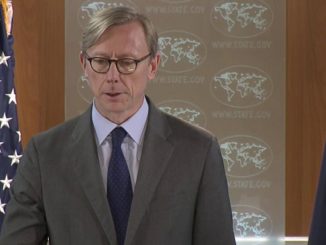
Press conferences, regularly conducted four or five times a week in both the Obama administration and in the early weeks of the Trump administration, have been held far less frequently of late. And when the White House does give a briefing now, it’s increasingly conducted off-camera, The Hill reads.
White House press secretary Sean Spicer has made just seven total appearances before the media in the 18 working days since President Trump came back from his first international trip, an unusually low number for a press secretary.
He held only two on-camera briefings during the week of May 29. Spicer and deputy press secretary Sarah Sanders held one on-camera briefing apiece the week of June 5. The week of June 12, Spicer held only one on-camera briefing. He has done only one so far this week, bringing the White House total to two in the last 10 days. The White House’s decision to conduct an increasing number of off-camera briefings could help the administration assert more control over its message, officials say.
Spicer has said the move will deprive reporters of the explosive exchanges they crave. But that drastic break with tradition has infuriated the press corps and split Trump’s allies, who believe the White House is missing out on an opportunity to directly reach the public without having his message filtered through a media they see as biased against him.
“The White House should stick to live, televised press briefings,” said Newsmax CEO Chris Ruddy, who is close friends with Trump. “There is so much media spin and this affords them a tremendous opportunity to speak directly to the American people unedited, as so many people today are tuning in to those press conferences to hear directly from the White House.”
Spicer drew huge ratings for his near-daily on-camera briefings in the administration’s early days, attention that Trump relished at the time.
But the White House has cut back drastically since the president returned from his trip abroad in late May.
When Spicer does speak to the press, he has dramatically altered the way he engages. The once-combative press secretary now gives only clipped responses before moving on to new questions, drawing complaints from reporters about the lack of information coming from the White House.
In between the increasingly rare briefings, the administration has scattered Air Force One gaggles and off-camera briefings in which reporters are often barred from even broadcasting even audio recordings of the proceedings.
Sanders was scheduled to brief reporters under those rules at the White House on Thursday — a move that would deprive both news consumers and public officials of the ability to see or hear from Trump’s designated spokespeople.
But the White House eventually agreed to allow television and radio networks to air sound from the briefing after it was over. There are also days in which the communications team has Trump do all of the talking at photo ops, roundtable meetings, over Twitter or at joint press conferences with world leaders, when just two American reporters typically get questions.
With the number of briefings reduced, the White House has also begun holding background calls with small groups of reporters as it seeks to steer coverage toward its policy goals — and away from the Russia controversy, The Hill reads.
“In a perfect world, the Trump White House would provide a daily press briefing — a daily on-camera, on-the-record press briefing,” said Sam Nunberg, a former Trump campaign aide.
“But I think some circumstances, such as probably the Russia investigation” make it hard for them to do that, Nunberg added.
The decision comes as Spicer has been leading a search for a possible successor, part of a planned shakeup of the White House communications operation. The changes comes as Trump’s tweets and public statements have repeatedly undermined the communication team’s own messaging work on his behalf.
Spicer admitted that effort is underway, telling reporters Tuesday, “we’ve been meeting with potential people that may be of service to this administration.”
The specter of the special counsel’s investigation into whether Trump associates colluded with Russia in Russian election-meddling efforts has hung over the press team, with spokespeople referring all inquiries on the subject to Trump’s private attorney.
Taken together, the developments have left the impression that the press team stands on shaky ground. Scott McClellan, who served as press secretary under former President George W. Bush, said the White House had to make changes because the briefings had become “problematic” and were “negatively impacting public opinion beyond the base.”
McClellan praised the White House’s ingenuity for including Cabinet officials in the briefings to take the load off of Spicer. But he said ultimately that’s only a stop-gap between addressing larger issues.




Be the first to comment